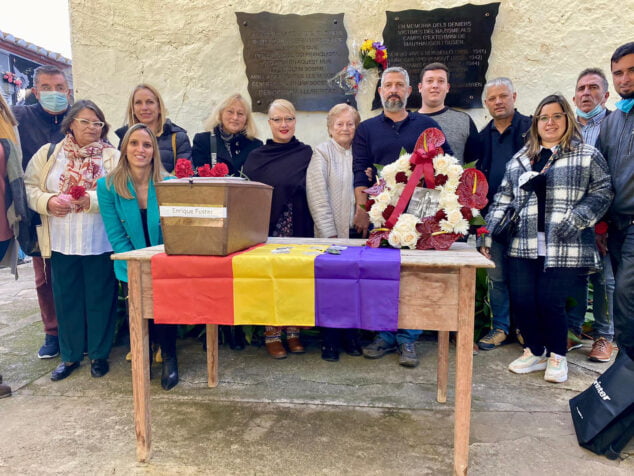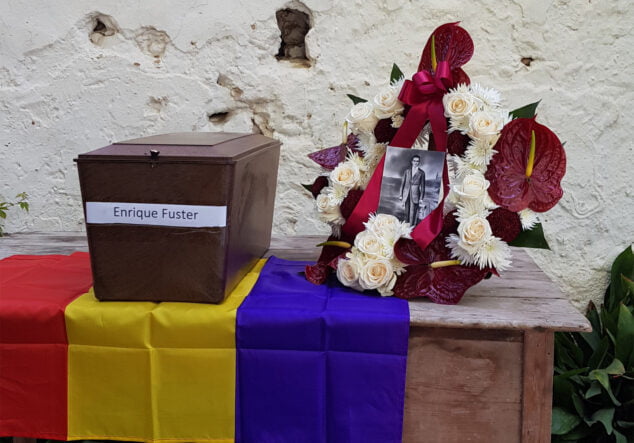The Paterna cemetery lived last Saturday the emotional act of handing over the remains of a score of people who were shot by the Franco regime and who have fought against oblivion in a common grave. Among them was Enrique Fuster Gilabert, who has already returned to the Dénia cemetery after receiving a tribute yesterday with the rest of the reprisals in the region.
More than 80 years have had to pass, but Enrique Fuster already rests in Dénia with his family. During this weekend, Fuster's family has recovered his remains to finally bury him in his town, where he has now been reunited with his wife in the cemetery of the capital of the Marina Alta.
On Saturday, November 6, the delivery of the remains of twenty reprisals during the first months of the Franco regime took place in the Paterna cemetery. All of them remained in a common grave in that same place, Grave 115, where a hundred bodies were found. DNA tests, however, have only allowed the identification of 21. Among them was Enrique Fuster, who was secretary of the CNT and for which he was assassinated by the dictatorship. "A life cut short for the sole cause of his ideology, for being a politician and secretary of a union, who defended and demanded the abolition of paid work, abusive rents, the 8-hour day, women's work and labor minimum wage, which today is the Spanish labor law regulated by the constitution ”, his granddaughter claimed during the act of memory of the victims of the Franco regime in the Marina Alta that was also held this weekend, on Sunday, in Dénia .
Enrique Fuster Gilabert was imprisoned in the Valencia prison and shot on March 8, 1940 in the Paterna cemetery. He was 32 years old. This Saturday his relatives recovered his remains as it was one of the 21 bodies in the grave whose DNA has been identified. All this after a long work in charge of ArqueoAntro that the Family Association of the Fosa 115 of Paterna undertook, managing to identify a score of bodies after more than two years of work. Thanks to the fact that one of his daughters remains alive, being the closest relative, DNA tests allowed one of those identified to be Enrique Fuster.
In Dénia the traditional act of the PSPV in homage to the 49 republished militants shot in the town's cemetery in 1939, which is why homage was also paid to this neighbor who now returns to his family. «Today is a special day for another reason as well. Yesterday I was in Paterna seeing how they delivered the remains that have been identified with the DNA of one of the graves, the 115. Of almost 100 people exhumed there, only 20 could be delivered with barely XNUMX. One of them is here, Enrique Fuster. They not only killed them here, they killed them where they were caught, ”said the activist of historical memory Matías Alonso during the act.
"Thanks to the historical memory today our family member, finally, will rest in peace next to his wife in the Dénia cemetery, accompanied by his children, grandchildren and other relatives," said his granddaughter Mª Rosario Roselló Fuster through a speech that his cousin Anros Fuster read. «He stops being anonymous and returns to the light because whoever was trapped by darkness has a name: Enrique Fuster Gilabert».
"We need a brave legislation that is committed to real reparation and the recovery of memory without fear"
The secretary general of the local group of the PSPV-PSOE of Dénia, Vicent Grimalt, compared during the act of Sunday the current works of exhumation of graves with the opening of the tomb of those executed to the Dianense cemetery, “when my mother and other relatives they pulled the strings of the murders, which in those years were untouchable, so that the grave could be opened, so that the deceased could be identified, so that those who had lost esteemed people could fire them with a certain dignity. And he highlighted "the determination of the doctor Manuel Lattur and the compassion of an undertaker who deposited personal belongings of the people that the Franco regime wanted to condemn to oblivion and who allowed the recovery of the names and surnames of those shot."
Grimalt recalled this episode to claim that "justice, even that which has to repair the irreparable death, and the recovery of historical memory, cannot depend on the good will and tenacity of those who are also victims of repression." «There are still many, too many, the voices that cry out not to remove the past. As if the people who are still here, children, grandchildren, nephews, great-great-grandchildren of those executed, weren't PRESENT ». The future Democratic Memory Law, he said with hope, "will culminate this long and costly process towards the acceptance of a sad and cruel past, ours, and towards honest reconciliation."
The investigations around the events that occurred in the Dénia cemetery, he announced, "are those that have made it possible to complete the work started with goodwill and kindness by a relative, a doctor, an undertaker ... and discover, for example, that the The initial list finally consists of 49 names and surnames of people who, now, we know with certainty that they lost their lives here, and here they lie, due to the barbarism of the repression ».
They also did not miss the annual appointment Rosa Avellà, secretary of Historical Memory of the PSPV in the Marina Alta, and the aforementioned Matías Alonso, coordinator of the Recovery of Historical Memory Group. Avellà recalled the populations of origin of those shot, Pego, Xaló, Pedreguer, Teulada, El Verger, Dénia, Ondara and Sagra, and insisted that "the recovery of historical memory is the alternative to silence and the victims have the right to reparation integral".
For his part, Matías Alonso thanked those present for "having resisted" and maintaining the tribute, "despite the fact that some chairs are already empty." He also recalled the innocence and the "bloodless hands" of the people who were shot and the repressive policy of "scorched earth" applied by Franco's troops when entering a new territory.
The act closed, as always, with the reading of the names and surnames of the 49 victims, a list to which Enrique Fuster was added this year, as number 50. Next, the participating people offered red carnations on the tomb of the honoree.










